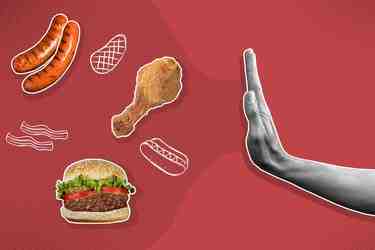Is it OK to eat chicken everyday?

Eating chicken every day is not a bad thing, but you need to be careful when choosing the right one and cook it properly. This may interest you : Is bacon good for weight loss?. Chickens may cause food poisoning with salmonella, bacteria found in poultry that can cause foodborne illness. So, be careful!
Is canned tuna healthy?

Yes, canned tuna is a healthy protein rich and contains many vitamins and minerals such as B-Complex vitamins, Vitamins A and D as well as iron, selenium and phosphorus. Read also : What meat is good for weight loss?. Tuna also contains omega 3 fatty acids DHA and healthy EPA.
What is the healthiest canned tuna you can eat? Canned light tubing is better, lower mercury choice, than FDA and EPA. White canned and yellow tuna is high in mercury, but it is still good to eat. Bake tuna should be avoided altogether, but this type of canned tuna is not used in any way.
How many cans of tuna can you eat in a week?
However, other sources say that you need to eat at least three cans of tuna a day for 6 months to reduce the risk of mercury poisoning. The U.S. Food and Drug Administration recommends restricting the consumption of albacore (white) tuna to less than 4 ounces per week and skipjack (light) tuna to 12 ounces per week.
Is a whole can of tuna too much?
Consumption of canned albacore tuna should not exceed 4 ounces (113 grams) per week (22). However, the FDA says it is safe for pregnant and lactating women to eat less mercury fish, such as canned tuna made from light or tuna skipjack (22). Recommends two to three 4-ounce (113-gram) servings per week (22).
Which tuna has less mercury?
When buying tuna, choose skipjack or canned light types, which do not contain as much mercury as albacore or water. You can use skipjack and canned light tuna along with other low-mercury species, such as cod, crabs, salmon and shellfish, as part of 2 3 3 recommended fish per week (10).
How much canned tuna is healthy?
According to the FDA, canned tuna, originally made from skipjack, was recognized as a fish with low mercury levels and was designated as “the best choice.” This means you can eat two to three times a week, or about 8 to 12 ounces.
How many canned of tuna can you eat a day?
Recommendations for healthy use of tuna can vary greatly. Some sources say that eating more than one piece of tuna every week may be dangerous. However, other sources say that you need to eat at least three cans of tuna a day for 6 months to reduce the risk of mercury poisoning.
Is canned tuna good to eat everyday?
People should limit their consumption of canned tuna made from albacore to one 4-ounce (113-gram) serving per week. This is because it is high in mercury (19). Instead, try to eat less mercury fish such as light and tuna skipjack.
How often should you eat meats?

When it comes to eating meat, quantity is not the most important â € “Try to aim for at least two days a week, and limit the number of days you eat meat to one. producers treat animals fairly.
Is it normal to eat meat every day? “You can eat meat every day and live a healthy lifestyle,” said Mia Syn, RD. “Meat is a source of high quality and complete protein, but you need to be careful about the type you use and how often.”
How often should you eat meat?
Try to limit your intake of red meat to 1 to 2 servings a week, which is 6 ounces or less per week. If you have heart disease or high cholesterol, the advice is to limit red meat to less than or equal to 3 ounces per week.
How many times does the average person eat meat a week?
To illustrate their point, the authors of the article referred to the average meat intake in North America and Western Europe two to four times a week. But we are not French, and about one-third of Americans eat more than this. In fact, on average we eat about five ounces (17 ounces) of red and processed meat a week.
Is it OK to eat meat once a week?
Eating red meat once or twice a week can be good for healthy eating, especially for toddlers and women of childbearing age. Slim meats, such as chicken and turkey, are non-slim options and can play a role in maintaining a healthy weight.
How much meat should you eat each week?
Dietitians recommend a maximum of seven lean red meats a week – beef, lamb, beef, pork or kangaroo. The usual diet is 65g of cooked meat (about 90-100 g of raw meat).
How many times a week should I eat red meat?
If you eat red meat, limit your intake to no more than three portions a week. Three portions equals about 350â 500 500g (about 12â € 18 18oz) cooked weight.
What is a healthy amount of meat to eat per day?
One ounce of meat equals 1 ounce of protein. Based on a 2,000-calorie diet, the U.S. Department of Agriculture recommends consuming no more than 4 ounces of total meat per day to help meet protein recommendations. Remember, however, that not all meat is made equal.
Can u eat steak everyday?

“If you have big pork on a Saturday night, that doesn’t mean you can’t have any red meat for the rest of the week,” Schenker said. “But I do not recommend eating red meat every day, even in small amounts.” Enjoy it responsibly – but most importantly, enjoy it.
Is it unhealthy to eat pork every day? Eating too much red meat can be bad for your health. Beef and juicy burgers are on the menu. But research has shown that eating regular red meat and processed meats can increase the risk of type 2 diabetes, heart disease, stroke and some cancers, especially bowel cancer.
How often can you eat steak?
Try to limit your intake of red meat to 1 to 2 servings a week, which is 6 ounces or less per week. If you have heart disease or high cholesterol, the advice is to limit red meat to less than or equal to 3 ounces per week.
Is steak OK to eat everyday?
Research presents conflicting guidelines on how healthy red meat should be consumed without risk, but for those concerned about risk management to the best of their ability, Allt recommends following World Cancer Research Fund guidelines for limiting intake red meat 12. to 18 ounces per week.
Can you eat steak 2 nights in a row?
While you can safely eat two small pieces of red meat every day, it is best to include a variety of protein sources in your diet, while keeping your red meat intake a few days a week. That is because too much red meat has been linked to cancer, diabetes and heart disease.
Can I eat steak 2 days in a row?
While you can safely eat two small pieces of red meat every day, it is best to include a variety of protein sources in your diet, while keeping your red meat intake a few days a week. That is because too much red meat has been linked to cancer, diabetes and heart disease.
Can I eat red meat 3 days in a row?
The World Cancer Fund and the American Institute of Cancer Research recommend limiting consumption of red meat by more than three portions a week, or 12â € 18 18 ounces.
Is it OK to eat steak every day?
If you eat red meat every day, your cholesterol may increase Your body needs cholesterol to build a healthy cell, but high cholesterol can increase your risk of heart disease. “Although cholesterol is essential, eating meat daily red can lead to cholesterol to reach unhealthy levels.
How many steaks a week can I eat?
The American Academy of Cancer Research recommends not eating more than 510g of cooked red meat a week â € “that is about six g 85g.
How many steaks is too many?
The World Cancer Fund and the American Institute of Cancer Research recommend limiting consumption of red meat by more than three portions a week, or 12â € 18 18 ounces.
How many steak should I eat a day?
One ounce of meat equals 1 ounce of protein. Based on a 2,000-calorie diet, the U.S. Department of Agriculture recommends consuming no more than 4 ounces of total meat per day to help meet protein recommendations. Remember, however, that not all meat is made equal.
How often should I eat fish?
A healthy, balanced diet should include at least 2 servings of fish per week, including 1 oily fish. That is because fish and shellfish are good sources of vitamins and minerals.
Sources :
